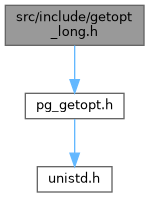Loading...
Searching...
No Matches
getopt_long.h File Reference
#include "pg_getopt.h"
Include dependency graph for getopt_long.h:

This graph shows which files directly or indirectly include this file:

Go to the source code of this file.
Data Structures | |
| struct | option |
Macros | |
| #define | no_argument 0 |
| #define | required_argument 1 |
| #define | optional_argument 2 |
Functions | |
| int | getopt_long (int argc, char *const argv[], const char *optstring, const struct option *longopts, int *longindex) |
Macro Definition Documentation
◆ no_argument
| #define no_argument 0 |
Definition at line 25 of file getopt_long.h.
◆ optional_argument
| #define optional_argument 2 |
Definition at line 27 of file getopt_long.h.
◆ required_argument
| #define required_argument 1 |
Definition at line 26 of file getopt_long.h.
Function Documentation
◆ getopt_long()
|
extern |
Definition at line 60 of file getopt_long.c.
63{
68
70 { /* update scanning pointer */
72
73retry:
74
75 /*
76 * If we are out of arguments or only non-options remain, return -1.
77 */
79 {
81 nonopt_start = -1;
83 return -1;
84 }
85
87
88 /*
89 * An argument is a non-option if it meets any of the following
90 * criteria: it follows an argument that is equivalent to the string
91 * "--", it does not start with '-', or it is equivalent to the string
92 * "-". When we encounter a non-option, we move it to the end of argv
93 * (after shifting all remaining arguments over to make room), and
94 * then we try again with the next argument.
95 */
97 {
101
103 nonopt_start = argc - 1;
104 else
105 nonopt_start--;
106
108 }
109
110 place++;
111
113 {
114 /* found "--", treat it as end of options */
115 ++optind;
118 }
119
121 {
122 /* long option */
123 size_t namelen;
125
126 place++;
127
130 {
133 {
135
137 {
141 has_arg == required_argument)
142 {
143 optind++;
145 }
146 else
147 {
150
153 "%s: option requires an argument -- %s\n",
154 argv[0], place);
155
157 optind++;
158
162 }
163 }
164 else
165 {
168 {
169 /* XXX error? */
170 }
171 }
172
173 optind++;
174
177
179
182 else
183 {
185 return 0;
186 }
187 }
188 }
189
194 optind++;
196 }
197 }
198
199 /* short option */
201
204 {
206 ++optind;
211 }
212
214 { /* don't need argument */
217 ++optind;
218 }
219 else
220 { /* need an argument */
224 { /* no arg */
230 "%s: option requires an argument -- %c\n",
231 argv[0], optopt);
233 }
234 else
235 /* white space */
238 ++optind;
239 }
241}
References BADARG, BADCH, EMSG, fb(), flag(), fprintf, i, name, no_argument, optarg, opterr, optind, optopt, and required_argument.
Referenced by get_opts(), handle_args(), handle_args(), main(), main(), main(), parse_psql_options(), parseCommandLine(), and regression_main().